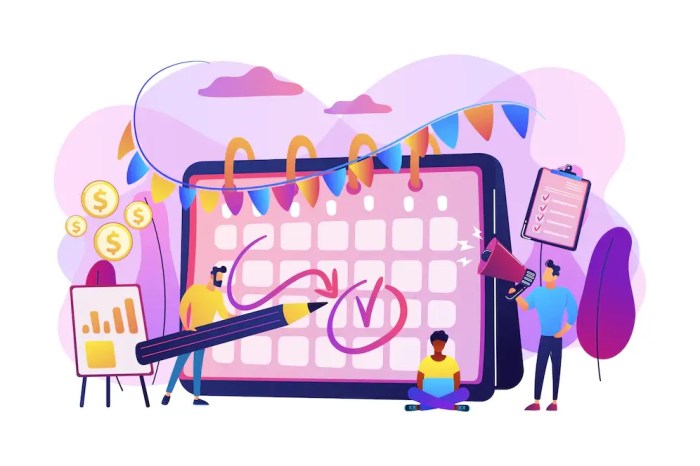Event Marketing for Small Businesses is the ultimate game-changer as it dives into the realm of boosting brand awareness and engaging target audiences. Get ready to uncover the secrets of successful event marketing campaigns tailored for small businesses.
Let’s explore the different event types, planning strategies, collaboration opportunities, and key metrics to measure the success of your event marketing efforts.
Importance of Event Marketing for Small Businesses

Event marketing plays a crucial role in helping small businesses increase brand awareness and connect with their target audience in a meaningful way. By organizing and participating in events, small businesses can create memorable experiences that leave a lasting impression on attendees.
Effective Engagement with Target Audience
Event marketing allows small businesses to engage with their target audience in a more personal and interactive manner. Through face-to-face interactions, businesses can build trust, establish relationships, and gather valuable feedback. For example, hosting a pop-up event or a workshop can provide a platform for direct engagement with customers, allowing businesses to showcase their products or services while receiving real-time feedback.
Successful Event Marketing Campaigns
1. Local Food Festival:
– A small restaurant in town organized a local food festival where they invited other local vendors to showcase their specialties. This event not only attracted food enthusiasts but also helped the restaurant gain visibility and build relationships with the community.
2. Charity Run:
– A fitness studio organized a charity run event to raise funds for a local cause. Participants were encouraged to register for the run and promote the event on social media, leading to increased brand awareness for the studio and a positive impact on the community.
3. Networking Mixer:
– A small business networking group hosted a networking mixer event where entrepreneurs and professionals could connect and collaborate. This event provided a platform for businesses to expand their network, generate leads, and foster partnerships, leading to mutual growth and success.
Types of Events Suitable for Small Businesses

When it comes to promoting products/services, small businesses can benefit from various types of events that help them reach their target market effectively. Hosting events like workshops, webinars, trade shows, and pop-up shops can create opportunities for businesses to engage with customers, showcase their offerings, and build brand awareness.
Workshops
Workshops are interactive events where businesses can provide hands-on experiences for attendees to learn more about their products/services. By offering valuable insights and practical knowledge, workshops can help establish credibility and trust with customers.
Webinars
Webinars are online seminars that allow businesses to educate their target audience about their offerings in a virtual setting. They are cost-effective and convenient, enabling businesses to reach a wider audience and generate leads through engaging presentations and discussions.
Trade Shows
Trade shows are events where businesses can showcase their products/services to a large number of potential customers within a specific industry. By participating in trade shows, small businesses can network with industry professionals, generate leads, and gain exposure in the market.
Pop-Up Shops
Pop-up shops are temporary retail spaces that allow businesses to create a unique and immersive shopping experience for customers. These events are great for testing new markets, launching products, and creating buzz around the brand, helping small businesses increase sales and brand visibility.
Planning and Organizing Successful Events: Event Marketing For Small Businesses
When it comes to event marketing for small businesses, proper planning and organization are key to success. From setting objectives to measuring success, there are essential steps that small businesses need to take to ensure their events are effective.
Setting Objectives
- Define clear and specific goals for the event, such as generating leads, increasing brand awareness, or driving sales.
- Ensure objectives are measurable so that success can be evaluated at the end of the event.
- Align objectives with the overall marketing strategy of the business to maximize impact.
Budgeting
- Create a detailed budget outlining all expenses, including venue rental, catering, marketing materials, and staff costs.
- Allocate funds based on priority areas and expected return on investment.
- Consider cost-effective options, such as partnering with other businesses or seeking sponsorships.
Selecting Venues
- Choose a venue that aligns with the event objectives and target audience.
- Consider factors like location, capacity, amenities, and ambiance when selecting a venue.
- Negotiate pricing and terms to ensure the venue fits within the allocated budget.
Promoting the Event
- Utilize social media platforms to create buzz and generate interest in the event.
- Create engaging content, such as teaser videos, event countdowns, and behind-the-scenes sneak peeks.
- Collaborate with influencers or industry partners to reach a wider audience and increase event visibility.
Measuring Success
- Track key performance indicators (KPIs) to evaluate the effectiveness of the event, such as attendance numbers, lead generation, and social media engagement.
- Solicit feedback from attendees through surveys or post-event interviews to gather insights for future events.
- Analyze data to identify areas of improvement and make adjustments for upcoming events.
Collaborations and Partnerships in Event Marketing
When it comes to event marketing for small businesses, collaborations and partnerships can play a crucial role in enhancing the success of an event. By teaming up with other businesses, influencers, or organizations, small businesses can reach a wider audience, increase brand visibility, and create a more engaging and memorable experience for attendees.
Benefits of Collaborating in Event Marketing
- Expand reach: Partnering with other businesses or influencers can help small businesses tap into new audiences and reach a larger number of potential customers.
- Shared resources: Collaborations allow businesses to pool resources, reduce costs, and access expertise that they may not have on their own.
- Enhanced credibility: Partnering with established businesses or influencers can boost the credibility and reputation of a small business, making it more attractive to customers.
Examples of Successful Partnerships in Event Marketing
A local boutique teamed up with a popular fashion blogger to host a styling workshop, attracting a large crowd of fashion enthusiasts and increasing foot traffic to the store.
A small restaurant collaborated with a local brewery to host a beer and food pairing event, which not only attracted new customers but also generated buzz on social media.
Approaching and Negotiating Partnerships for Events
- Identify potential partners: Look for businesses or influencers that share a similar target audience or brand values to ensure a successful partnership.
- Reach out with a proposal: Clearly Artikel the benefits of collaborating and what each party can bring to the table. Be open to negotiation and find common ground to create a win-win situation.
- Create a formal agreement: Once both parties agree on the terms, make sure to document the partnership details in a formal agreement to avoid any misunderstandings down the line.
Measuring the Success of Event Marketing Efforts
Event marketing can be a powerful tool for small businesses to increase brand visibility, generate leads, and engage with their target audience. However, it is essential to measure the success of these efforts to understand the impact of the events and make informed decisions for future strategies.
Key Metrics for Measuring Success
- ROI: Calculating the return on investment from an event is crucial to determine if the resources allocated to it were worthwhile. This can be done by comparing the costs incurred with the revenue generated as a direct result of the event.
- Engagement Levels: Monitoring engagement metrics such as social media interactions, website traffic, and attendee feedback can provide insights into the level of interest and interaction generated by the event.
- Lead Generation: Tracking the number of leads generated from the event and analyzing their quality can help determine the effectiveness of the event in driving potential customers to the business.
- Brand Visibility: Measuring the increase in brand awareness, mentions, and recognition following the event can indicate the success of efforts to enhance brand visibility.
Analyzing Data for Future Strategies, Event Marketing for Small Businesses
Small businesses can leverage data collected from events to improve their marketing strategies in the following ways:
- Identifying successful tactics: Analyzing data on attendee preferences, engagement levels, and conversion rates can help businesses understand what worked well and what can be improved for future events.
- Segmenting audience: Using data to segment the audience based on demographics, interests, and behaviors can enable businesses to tailor their marketing messages and offerings to different target groups more effectively.
- Optimizing resources: By analyzing the ROI of different event marketing initiatives, businesses can allocate resources more efficiently and focus on strategies that deliver the best results.